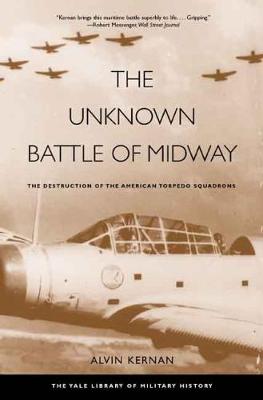Yale Library of Military History
2 total works
What really happened at the famous Battle of Midway? A survivor sets the record straight.
"The clearest and most persuasive story of the Battle of Midway I have ever read or heard."-Donald Kagan, Yale University
The Battle of Midway is considered the greatest U.S. naval victory, but behind the luster is the devastation of the American torpedo squadrons. Of the 51 planes sent to attack Japanese carriers only 7 returned, and of the 127 aircrew only 29 survived. Not a single torpedo hit its target.
A story of avoidable mistakes and flawed planning, The Unknown Battle of Midway reveals the enormous failures that led to the destruction of four torpedo squadrons but were omitted from official naval reports: the planes that ran out of gas, the torpedoes that didn't work, the pilots who had never dropped torpedoes, and the breakdown of the attack plan. Alvin Kernan, who was present at the battle, has written a troubling but persuasive analysis of these and other little-publicized aspects of this great battle. The standard navy tactics for carrier warfare are revealed in tragic contrast to the actual conduct of the battle and the after-action reports of the ships and squadrons involved.
"One of the most arresting naval autobiographies yet published."-Sir John Keegan
"An honest story of collective courage, evocative, well-written, and fixed before the colors fade."-Kirkus Reviews
"[Kernan] recounts a wonderful and exciting American story about a poor farm boy from Wyoming who enlisted in the Navy. . . .[He] has written eight other books. I will go back and read them all."-John Lehman, Air & Space
"Details . . . make the moment vivid; that is what it was like, on the Hornet in its last hours."-Samuel Hynes, New York Times Book Review

